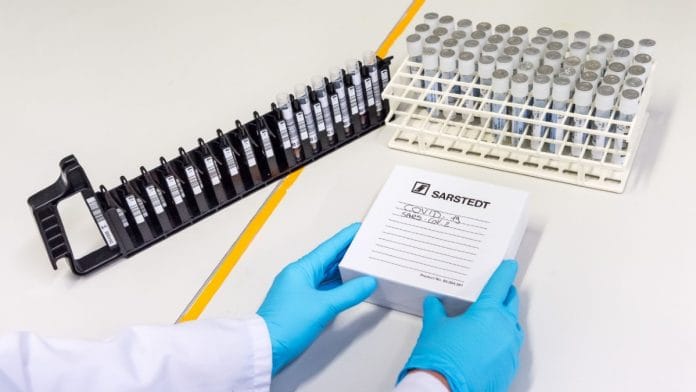New Delhi: In an important milestone in the Covid-19 vaccine race, an experimental vaccine from China, which was the first candidate to proceed to human trial, has been found to be safe and is able to generate an immune response against SARS-CoV-2 in humans.
The clinical trial of the vaccine in 108 healthy adults in China showed promising results after 28 days, according to the research published in The Lancet.
Even though the final results will be evaluated in six months, researchers claimed that the interim findings are promising enough to proceed with the second phase of human trials.
“The trial demonstrates that a single dose of the new adenovirus type 5 vectored COVID-19 (Ad5-nCoV) vaccine produces virus-specific antibodies and T cells in 14 days, making it a potential candidate for further investigation,” Professor Wei Chen, from the Beijing Institute of Biotechnology in China, said in a statement.
However, he also cautioned that the results need to be interpreted cautiously.
“The challenges in the development of a COVD-19 vaccine are unprecedented, and the ability to trigger these immune responses does not necessarily indicate that the vaccine will protect humans from COVID-19,” Wei added.
Also read: Coronavirus isn’t the killer, our immune response is
Vaccine uses a weakened common cold virus
The adenovirus type 5 (Ad5) vectored Covid-19 vaccine is being developed by the Chinese vaccine company CanSino Biologics.
The vaccine uses a weakened common cold virus called adenovirus, which infects human cells easily but does not cause a disease. The adenovirus is used as a delivery system — it carries the genetic material which helps create the SARS-CoV-2 spike protein to the cells.
The spike protein helps the novel coronavirus enter and infect the human cells.
These cells then produce the coronavirus spike protein, triggering the immune system to create antibodies that will fight off the virus.
Immune response generated within two weeks
The trial in China assessed the safety of the vaccine in humans, and its ability to generate an immune response in 108 healthy adults who did not have SARS-CoV-2 infection.
These volunteers received a single injection of the Ad5 vaccine with three different doses — high, middle and low.
Following this, the team regularly tested the volunteers’ blood to assess if the vaccine activated the two parts of the body’s immune system: The ‘humoral response’ and the T-cell response.
The ‘humoral response’ is a part of the immune system that produces neutralising antibodies that can fight infection and offer immunity from the virus.
The other part of the body’s immune response depends on a group of T-cells, a type of white blood cells, to fight the virus.
All doses of vaccination triggered some level of immune response within two weeks.
After 28 days of vaccination, most participants had a four-fold increase in binding antibodies. These antibodies can bind to the coronavirus but do not necessarily attack it. Furthermore, half of the participants in the low- and middle-dosage groups and three-quarters of those in the high-dosage group showed neutralising antibodies against SARS-CoV-2.
The vaccine also triggered a T-cell response in a majority of the volunteers.
Also read: Remdesivir cuts recovery time of Covid patients from 15 days to 11: New peer-reviewed study
No serious adverse events
No serious side-effects were reported by the volunteers within 28 days of administering the trial vaccine.
Mild adverse reactions included mild pain at the injection site in over half the vaccine recipients, fever in 46 per cent of the participants while 44 per cent complained of fatigue.
Approximately 39 per cent of those vaccinated experienced headaches while 17 per cent reported muscle pain.
One volunteer, who received a high dose of the vaccine, complained of high fever along with severe symptoms of fatigue, shortness of breath and muscle pain. However these adverse reactions persisted for less than 48 hours, the study noted.
Limitations of the study
The researchers noted that people who have already developed a high immunity to the adenovirus had a less positive antibody and T-cell response to the vaccine.
“Our study found that pre-existing Ad5 immunity could slow down the rapid immune responses to SARS-CoV-2 and also lower the peaking level of the responses. Moreover, high pre-existing Ad5 immunity may also have a negative impact on the persistence of the vaccine-elicited immune responses,” said Professor Feng-Cai Zhu from Jiangsu Provincial Center for Disease Control and Prevention in China who led the study.
The trial also had a small sample size, relatively short duration of study, and no control group, which would have allowed scientists to compare the volunteers to those who did not receive the vaccine.
Noting these limitations, the researchers said that further trials will be needed before the vaccine becomes available to all.
The phase 2 trial of the Ad5-nCoV vaccine has been initiated in Wuhan in 500 healthy adults. Of these, 250 volunteers will be given a middle dose, 125 will be given a low dose, and 125 will be given a placebo.
For the first time, the trial will also include participants over 60 years of age, an important target population for the vaccine.
Also read: US govt body now says Covid doesn’t spread as easily from contaminated surfaces or animals






